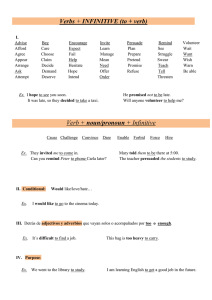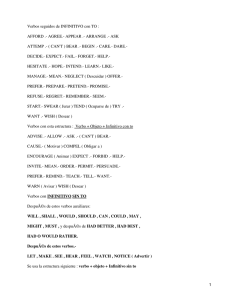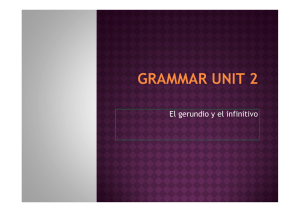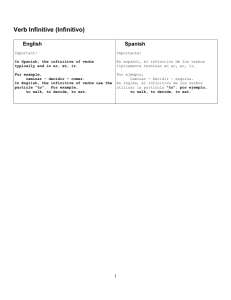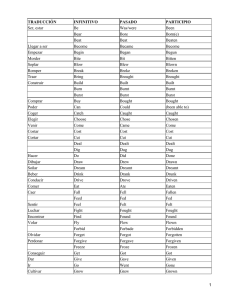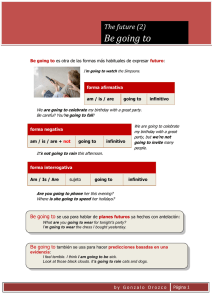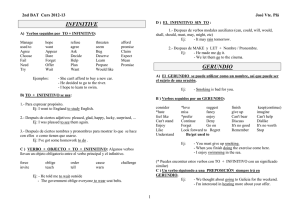Infinitive and Gerund after verbs/expressions TO +
Anuncio
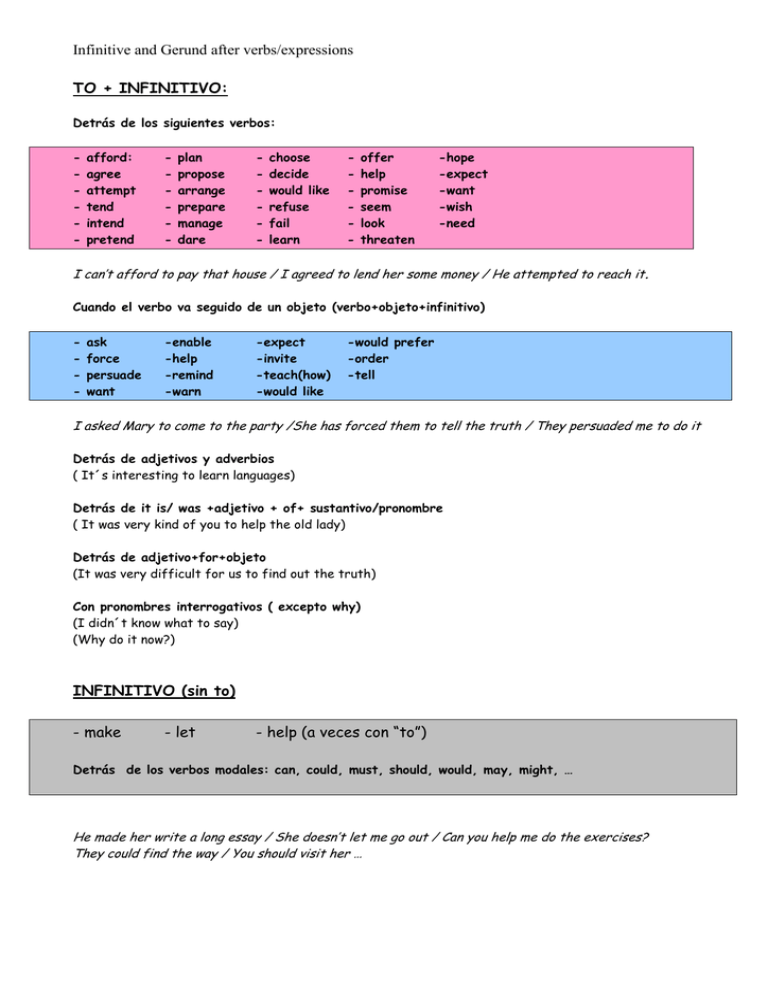
Infinitive and Gerund after verbs/expressions TO + INFINITIVO: Detrás de los siguientes verbos: - afford: agree attempt tend intend pretend - plan propose arrange prepare manage dare - choose decide would like refuse fail learn - offer help promise seem look threaten -hope -expect -want -wish -need I can’t afford to pay that house / I agreed to lend her some money / He attempted to reach it. Cuando el verbo va seguido de un objeto (verbo+objeto+infinitivo) - ask force persuade want -enable -help -remind -warn -expect -invite -teach(how) -would like -would prefer -order -tell I asked Mary to come to the party /She has forced them to tell the truth / They persuaded me to do it Detrás de adjetivos y adverbios ( It´s interesting to learn languages) Detrás de it is/ was +adjetivo + of+ sustantivo/pronombre ( It was very kind of you to help the old lady) Detrás de adjetivo+for+objeto (It was very difficult for us to find out the truth) Con pronombres interrogativos ( excepto why) (I didn´t know what to say) (Why do it now?) INFINITIVO (sin to) - make - let - help (a veces con “to”) Detrás de los verbos modales: can, could, must, should, would, may, might, … He made her write a long essay / She doesn’t let me go out / Can you help me do the exercises? They could find the way / You should visit her … Infinitive and Gerund after verbs/expressions USO DEL GERUNDIO Detrás de los siguientes verbos: - admit consider imagine mind involve avoid - deny detest dislike delay postpone put off - cease finish give up resist look forward to miss - practice risk suggest keep on carry on go on - enjoy* love* like* hate* Los verbos con “*” podrían ir seguidos de infinitivo Normalmente con expresiones como: can´t help, can´t stand, can’t bear Siempre con expresiones como: it´s (not) worth, it’s no use, to be used to/to get used to It’s no use talking to her, she won’t listen / They got used to driving on the left. Detrás de una preposición i.e. I watched TV after doing the washing up. Como sujeto de una oración i.e. Smoking is not healthy Para expresar prohibiciones cortas i.e No smoking VERBOS SEGUIDOS DE INFINITIVO O GERUNDIO con cambio de significado -remember - forget - regret - stop - mean - try El significado de estos verbos cambia en función de que les sigan infinitivos o gerundios. Los verbos de percepción SEE HEAR FEEL SMELL WATCH también pueden ir seguidos de objeto + Infinitivo sin to o de objeto +ing A continuación podéis estudiar los apuntes tomados de la página: fundacionloyola.org, de la cual he tomado ejemplos y algunas notas para elaborar los apuntes anteriores. Infinitive and Gerund after verbs/expressions 1. FORGET + TO + INF= se refiere a acciones futuras i.e Don´t forget to feed the cat FORGET + GERUNDIO se refiere al pasado i.e. Has he forgotten saying that? 2. REGRET TO + INF se refiere al presente o al futuro i.e We regret to give you such bad news REGRET + GERUNDIO se refiere al pasado i.e. She doesn´t regret lying to us 3. REMEMBER + to +INFINITIVO: se refiere a una acción en el futuro o una acción futura vista desde el pasado i.e. Before you go to bed, remember to switch off the TV i.e. Before she went to bed, she remembered to switch off the TV REMEMBER + GERUNDIO : se refiere al pasado i.e I remember telling him before 4. STOP + INFINITIVO: “dejar de a hacer algo en movimiento para hacer una cosa distinta i.e. We stopped the car to buy some magazines STOP + GERUNDIO : simplemente dejar de hacer una acción i.e she stopped crying 5. TRY + TO + INFINITIVO: intentar hacer algo con un esfuerzo i.e Try to push the door with both hands TRY + GERUNDIO: “experimentar, probar algo i.e Try studying a little harder to pass your exam fundacionloyola.org
